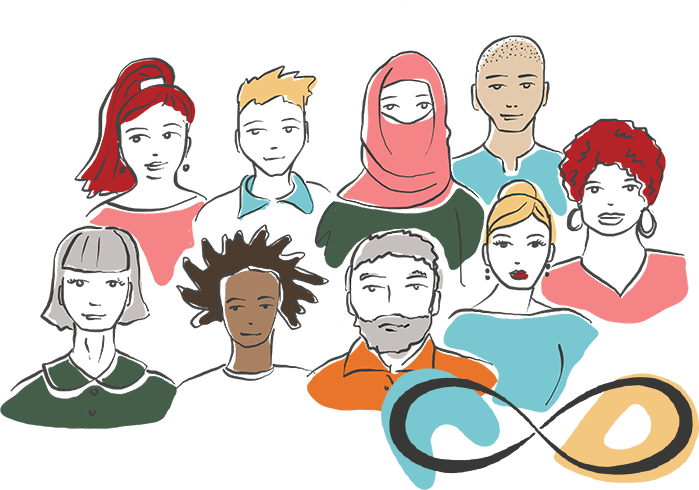
Noor is an Autistic Muslim woman of color and a proud mother to her Autistic daughter. She has two university degrees, one diploma, and many, many favorite books. She is passionate about the role of spirituality in healing and the power of writing our own healing narratives. Noor is a regular contributor to the NeuroDivergent Collective, a collective of Autistic experts from a wide range of fields who publish multimedia content on various topics pertaining to Autism, ADHD, PDA, Dyslexia, Tourettes and more, for the purpose of educating and informing families, individuals, educators, and Allied Health. Last week Noor shared the life-changing experience of discovering her Autistic identity and how that has shaped her family relationships. This week she shared her work with the ND Co. and her passion for healing narratives.
You’ve written that you are passionate about the “power of writing our own healing narratives.” I am also passionate about the authority of personal experience. How have healing narratives played a role in your life in the past and today?
Healing narratives played a tremendous important role in my life in the past and today, and it’s a journey, it’s a process.
I made a lot of mistakes growing up stemming from that traumatic childhood of being undiagnosed autistic with most likely undiagnosed autistic parents. In my part of the world, where I was born, where I was from until I moved away to the West to grow up, there’s a lot of ancestral trauma: the trauma of being colonized, the trauma of being made to feel inferior, of always feeling less than, of always centering the white voice and white models of success, taking away from the beautiful, inherent indigenous culture and heritage already present in my people. That’s massive, and being autistic on top of that and undiagnosed, was really, really traumatizing.
But I’m healing now, and my daughter won’t have to go through the pain I did because she has me. She has me and my husband. My husband is neurotypical and is also very compassionate and understanding and is a staunch supporter of our neurotype. He works so well with my daughter because he’s had lots of practice working with me.
In the beginning, I always knew I needed lots of solitude, and I always thought it was because I was highly sensitive and introverted. But I also kept having sensory issues that wouldn’t go away. And I was always deeply empathic and kept picking up on everyone’s feelings all the time. I had really awkward humor around uncomfortable topics like death and all of these things. And I always thought it was just me, and my husband helped me put the pieces together.
In the past I definitely had a tendency to fall into victim mode and ‘woe is me’ mode and ‘I don’t deserve all the abuse I had growing up,’ and that’s true. But I’m an adult now, and I’m safe now, and I create safety every day for my children and in my home. And moving forward, I’m excited to keep showing up for my daughters, keep building networks of safety in their childhood. And I hope they look back and have very fond memories.
How long has the NeuroDivergent Collective been in existence? What is your role within the organization?
It went live November/December of last year. My role is that I provide the voice of the Muslim woman of color, and every month I create content. In the beginning I started off with articles, but they ended up being quite time-consuming for me, so I’m really grateful that they are quite flexible, so now I do two 10-minute audio recordings, and It’s been wonderful being paid to give a voice to my experience. Of course I do not represent every Muslin autistic woman of color on the planet, it’s simply a window into my life.
What is unique/special about the NeuroDivergent Collective? Ideally, what traditional services/roles/tools would you like to see it replace that are in circulation today?
It’s incredible how we’re all autistic. We are all different and unique. We have different job roles, we have different ethnicities, we have different genders, and it’s incredible to see how we’re all connected through our neurotype. I would definitely love to see the ND collective being accessible to anyone whether they be someone who has just realized “hey, I’m autistic!” or someone who realized their child is autistic, whether they are neurotypical or not.
I would definitely like to see an abolishment of anything related to ABA or any kind of behavioral therapy that’s meant to suppress how autistic children are because that’s deeply harmful. I guess there are a lot of neurotypical parents who don’t know any better, so there’s a big push for ABA by the medical community, unfortunately, because they view autism spectrum disorder as a disorder, but I reject that narrative. Being autistic is a neurotype, a different neurotype that is inconvenient for the medical establishment because they just want everyone to be like neurotypicals.
But the solution is to accommodate, to change structures in society to make everything accommodate those of us who have disabilities, whether they are visible or invisible, and to not base our worth on our output, because we’re people first and foremost and our worth is not meant to be attached to how much we produce financially. Nevertheless, I have a lot of internalized capitalism and internalized ableism and internalized Islamaphobia I’m unpacking.
Noor creates content based on her own experiences for the Neurodivergent Collective, with audio recordings on topics such as:
- How to have an Autistic-friendly Ramadan,
- Working with demand avoidance,
- Setting boundaries, and
- Choosing the right therapist/teacher/etc. for an Autistic child.
Click here for a sneak peek at the Neurodivergent Collective Portal.
